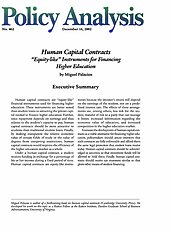Human capital contracts are “equity-like” financial instruments used for financing higher education. These instruments are better suited than student loans to attracting the private capital needed to finance higher education. Further, since repayment depends on earnings and thus adjusts to the student’s capacity to pay, human capital contracts should be more attractive to students than traditional student loans. Finally, by making transparent the relative economic value of certain fields of study or the value of degrees from competing institutions, human capital contracts would improve the efficiency of the higher education market as a whole.
Under a human capital contract, a student receives funding in exchange for a percentage of his or her income during a fixed period of time. Human capital contracts are equity-like instruments because the investor’s return will depend on the earnings of the student, not on a predefined interest rate. The effects of these arrangements are, among others, less risk for the student, transfer of risk to a party that can manage it better, increased information regarding the economic value of education, and increased competition in the higher education market.
To ensure the development of human capital contracts as a viable alternative for financing higher education, policymakers should assure investors that such contracts are fully enforceable and afford them the same legal protection that student loans receive today. Human capital contracts should be acknowledged as securities so that investment funds will be allowed to hold them. Finally, human capital contracts should receive tax treatment similar to that given other means of student financing.
About the Author

This work is licensed under a Creative Commons Attribution-NonCommercial-ShareAlike 4.0 International License.
